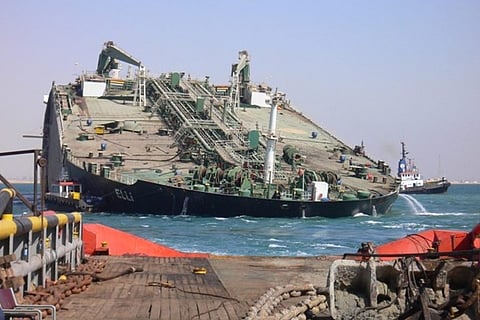

I was reading some remarks written recently by a very senior pilot who clearly has boarded an awful lot of ships in his long career. He is increasingly concerned about the obvious difficulties of trying to fit bigger and bigger ships into ports that had failed to expand to accommodate them. He is not the first person to comment on what often appears to be the unrealistic expectations of people who own ships and those they commission to design them. And as pilots will be blamed when the quart fails to get into the pint pot, possibly with a lot of bent steel and bad language, he is entitled to his complaints.
Boundaries, it might be thought, are there to be pushed, just as science evolves through challenge, but in the maritime world, it has seemed to me, there is a great deal that has only been discovered, after they have pushed accepted ideas too far. Perhaps it is because ships, unlike aircraft or cars, don't run to prototypes so any snags only manifest themselves after the craft has taken to the water. Sometimes this can really be very expensive – even fatal.
Over a cheerful lunch with a naval architect of roughly my vintage, we tried to list just some of the unintended design consequences that have emerged during our respective careers. Mine, I ought to say, began in the middle of the last century. We began with fast, fine-lined ships, which the liner operators were buying in the immediate pre-container era. Great idea – speedy ships, with hulls honed to resistance-reducing perfection.
What was not realised until too late was their habit of burying their bows in an oncoming swell, taking thousands of tons on the foredeck. Some ended up bent like bananas; one emerged from the seething mass of sea with half the foredeck gone.
We both recalled the emergence of the "supersized" tankers after designers had been charged with making scale economics happen. That went jolly well, until some of these monsters began to explode, ushering in the practice of inerting, rather too late for some. And from these ships came super-pollution and the need for salvage tugs and equipment to dealing with this new race of giants. Harsh lessons were learned the hard way, when so many might have been anticipated.
The notion of cutting huge holes in the shell plate and loading cargo horizontally (rather than vertically) ushered in the age of the Ro-Ro. There were some very sad lessons learned here; about free surface, about closing appliances and the wisdom of main decks beneath the waterline, driven by mad ideas about minimising gross tonnage. My friend recalled the Ro-Ro that was sunk when the movement of a flock of sheep caused the open stern door to dip. I remembered the account of the Ro-Ro submerging when a heavy truck being loaded caused the open bunker door to be submerged.
We are still discovering new hazards that affect very large vehicle carriers, now that they are carrying electric cars in volume numbers, all with their batteries installed. And along the way operators of these multi-decked monsters have been forcibly reminded about lessons of basic stability, the need for accurate and timely weight declarations for the cargo planners, and the ever-present fire dangers, which directly increase with ship size.
It took many years and very many lives before the industry woke up to the lessons learned from bulker sinkings, after first principles on repair and maintenance had been forgotten and the consequences of brutal treatment in ports, poor design, and structural fatigue had been realised. Looking back over these tragedies, there was nothing remarkable about neglected ships succumbing to the seas – the awful thing was the time it took to implement life-saving reforms, which largely was no more revolutionary than adequate inspection.
We recalled the rapid escalation in cruise ship size and capacity, and some of their more surprising vulnerabilities, that only time in service demonstrated. Ships that looked "top-heavy" were anything but, angrily said their designers, then had to admit that large and rapid course alterations were to be avoided if grand pianos were not to be accelerating around the ship and passengers tumbling down stairs. Balconies suites were what the customers wanted; the discovery that most were constructed of flammable material and that external conflagrations leaped around the internal fire barriers was found out the hard way, through experience.
There was the astonishing scaling up of the containerships, which apart from overwhelming the port sector, has had a number of unintended consequences, such as parametric rolling and multiple container losses in heavy weather, not to mention the difficulty of controlling these monsters at low speeds. Somebody pointed out that containers have been with us for half a century, but we still use the same systems to lash them ten high as were found on the first-generation ships. But a lot of extrapolation in design, scantlings, structure, and equipment has accompanied the industry's march towards gigantism.
Are there any common features here, viewed over more than 60 years? Certainly boundaries have been pushed, but many of these emergent problems have been the consequences of haste in an increasingly impatient age. My wife puts it down to greed, but if people slowed down and thought about what unexpected problems might emerge when moving into unknown operational territories, it might have saved a lot of grief.
Nothing new about this – you might recall that it was largely impatience (and unrealistic design expectations) that sank Titanic.
Submissions wanted! Do you have an exciting, amusing, or downright dangerous anecdote from your time in the maritime world? Send your submissions to: editor@bairdmaritime.com.
